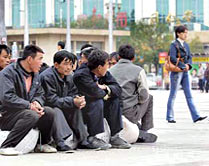
If a man works 12 hours a day, seven days a week, is despised and poorly paid, has no stable relationships, entertainment or social life, what will happen to him?
A mental breakdown?
This is the sad reality of many of China's 100 million rural migrant workers who have come to urban areas such as Beijing and Shanghai in search of employment.
Experts attending the recently ended 28th International Congress of Psychology are appealing for additional attention to be paid to this psychologically vulnerable group as China's fast-developing urban areas take shape.
Each year, 15 million farmers leave their lands and flock to the cities for jobs. While they represent the backbone of the construction labour that is transforming China's very core, they often live on the fringes of urban life.
"They live in isolation -- far from families, no community support, suffering discrimination from urban neighbours and with no relationships. This will probably cause emotional breakdowns," said Wang Chun'guang, a researcher at the Chinese Academy of Social Sciences.
According to Chen Bing, an experienced psychiatrist at Beijing's Anding Hospital, rural migrants are vulnerable to cultural shock, unfair treatment and hard travel to distant cities.
Some migrant workers also suffer from sex-based psychosis. A survey of 1,900 migrant workers in Shenzhen, the prosperous city in south China's Guangdong Province, indicated that more than 50 percent have sexual difficulties and more than 20 percent have visited prostitutes.
While no accurate estimates exist about how many rural migrants have psychiatric problems, Zhang Zhiqiang, a 36-year-old migrant from Sichuan Province working on a construction site, described the life led by people like himself as one of "loneliness, anxiety and depression -- these are problems of urban people but the everyday reality for us."
According to Chen, few rural migrants will go for therapy because they cannot afford it. They usually buy the cheapest drugs and endure their strong side effects.
Wang blamed the isolation on the absence of community and public life, but he said the government's training programmes for the migrant workers partly eases the situation.
However, Zhang said mere governmental efforts are far from enough.
"We ourselves should build communities to offer help for the suffering," Zhang said.
He works part-time for a non-governmental organization providing counselling for rural migrants. The organization also holds lectures on city laws and regulations and provides training in English as a second language.
However, such organizations face on-going registration problems.
"We should and are able to solve some problems by ourselves. We wish the government could give us more support, however," Zhang said.
(China Daily August 16, 2004)
|

